WEDNESDAY, Oct. 12, 2016 (HealthDay News) — Wondering how to tell your kids a baby brother or sister is on the way and how they will react to the news?
How children respond depends on their age, according to the American Academy of Pediatrics (AAP). Knowing what to expect can help parents break the news in a positive way.
1- to 2-year-olds
These little ones won’t fully grasp the news but will feed off their parents’ joy. Mom and Dad should talk about the new baby and let kids feel their enthusiasm. Parents can also read them picture books about the arrival of a new sibling.
At this age, kids need a lot of time and attention from their parents. When the baby arrives, some alone time or a special activity will reassure big brother and big sister they are still loved. It’s a good idea for Mom and Dad to ask relatives and friends to help out.
2- to 4-year-olds
At this age, most kids are very attached to their parents and may have trouble sharing them with anyone. A new baby may make them feel threatened. To ease these feelings, the AAP advises:
Wait to tell them about the new baby until later in the pregnancy or when Mom’s growing belly evokes questions.
Read picture books about new siblings.
Be honest. Tell them a newborn will be cute but also may be fussy and need attention. It may be a while before a new brother or sister can play with them.
Let children know they won’t be loved any less.
Encourage them to help plan and shop for the new baby.
Let them play with their old baby toys before they are passed on to a new sibling.
Give them a doll so they can take care of “their” baby.
Plan major changes in kids’ routines around the newborn’s arrival. If possible, potty training should be complete before a new baby comes home. If that’s not possible, wait until things settle down.
Expect setbacks. Preschoolers may have bladder or bowel accidents or want to drink from a bottle. This is normal. Give them extra attention and praise them whenever they act “grown up.”
Before the delivery, let little ones know Mom will be in the hospital for at least a couple of days.
Schedule time to read, play games or talk to them. This will reassure kids they are still loved. So will some extra alone time with Dad.
Help preschoolers feel included by letting them cuddle up during baby’s feeding time.
School-aged children
By age 5, kids usually don’t feel as threatened by a new baby, but they may resent the extra attention given to a newborn. The AAP offers these tips:
Explain what is happening in a way they can understand.
Let them help prepare for the baby. They can help shop for supplies, pick out toys and clothes, and help decorate the baby’s room.
Let them visit the hospital once the baby is born so they feel included.
Help them feel they have a role in the new baby’s care.
Praise loving and gentle gestures toward the newborn.
Try to spend some alone time with older children each day, paying attention to their needs and activities.
Remind them they are loved and are special.
More information
The U.S. Centers for Disease Control and Prevention has more about infant and toddler care

